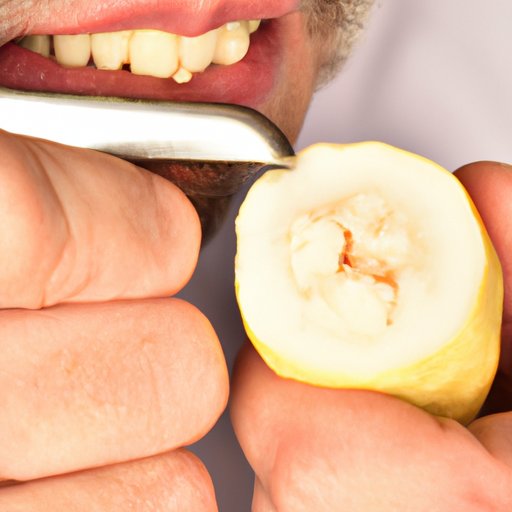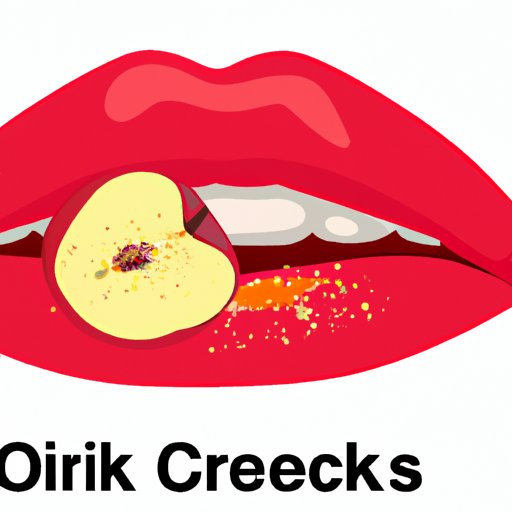
I. Introduction
Canker sores, also known as aphthous ulcers, are painful, round or oval-shaped sores that form inside the mouth. They can appear on the tongue, gums, roof of the mouth, or inside the cheeks and lips. While canker sores are often harmless, they can be painful and sometimes difficult to get rid of. According to the American Dental Association, about 20% of the population suffers from recurring canker sores. This article will explore various ways to get rid of canker sores, including natural remedies, medical treatments, and preventative measures.
II. Home remedies for canker sores
Many people prefer to use natural remedies for canker sores before turning to medical treatments. Salt water gargles are a popular option that involves rinsing the mouth with warm salt water. This can help soothe the sores and promote healing. Aloe vera is another natural remedy that can help relieve pain and reduce inflammation. Simply apply a small amount of aloe vera gel to the affected area a few times a day. Honey is also believed to have healing properties, and can be applied directly to the canker sore.
When using these home remedies, it’s important to follow a few tips to ensure effectiveness. For salt water gargles, use warm water and stir in a teaspoon of salt until it dissolves. Gargle for 15-30 seconds before spitting the water out. Aloe vera and honey can both be applied directly to the sore with a clean finger or cotton swab. Be sure to use raw honey for best results.
III. Medical treatments for canker sores
If home remedies aren’t providing relief, there are several medical treatments that can help get rid of canker sores. Over-the-counter ointments like Anbesol and Orajel can be applied directly to the sore to numb the area and provide pain relief. Prescription medications like corticosteroids and antimicrobial mouthwashes may also be recommended for more severe cases.
In recent years, laser treatment has become a popular option for getting rid of canker sores. This involves applying a low-level laser to the sore to help reduce inflammation and promote healing. Laser treatment is generally painless and has a high success rate.
If your canker sore is severe or doesn’t go away after a few weeks, it’s important to see a doctor or dentist for further evaluation. They may recommend a biopsy to rule out any underlying conditions, or other treatments like oral rinses or antiviral medications.
IV. Foods to avoid when you have a canker sore
Some foods can irritate canker sores and make them worse. For example, acidic foods like citrus fruits and tomatoes may cause a stinging sensation when they come in contact with the sore. Spicy foods and chocolate can also aggravate canker sores. It’s best to avoid these foods until the sore has healed.
Some people also find that certain foods like nuts, seeds, and potato chips can scratch the inside of the mouth and trigger canker sores. If you have a history of frequent canker sores, it may be helpful to keep a food diary to identify any triggers and avoid them in the future.
V. Preventing canker sores in the first place
While canker sores can be difficult to prevent altogether, there are a few things you can do to lower your risk. Practicing good oral hygiene is important, as canker sores can often be caused by bacteria in the mouth. This includes brushing your teeth twice a day, flossing regularly, and using an alcohol-free mouthwash.
Stress is also a common trigger for canker sores. To reduce stress, try practicing relaxation techniques like deep breathing, meditation, or yoga. Regular exercise and getting enough sleep can also help reduce stress levels.
Some people find that certain vitamins and supplements can help prevent canker sores. For example, taking a daily multivitamin that includes zinc, folate, and iron may help reduce the frequency of canker sores. Probiotics, which help support a healthy gut microbiome, may also be beneficial for preventing canker sores.
VI. How to relieve pain and discomfort from canker sores
If you do develop a canker sore, there are several things you can do to manage pain and discomfort while waiting for it to heal. Topical pain relievers like Anbesol and Orajel can be helpful, as can over-the-counter pain medications like ibuprofen or acetaminophen.
Avoid hot, spicy, or acidic foods that may irritate the sore. Stick to softer, blander foods like oatmeal, soup, and mashed potatoes. It’s also important to stay hydrated and drink plenty of water.
Managing stress is another important aspect of relieving pain and discomfort from canker sores. Try relaxation techniques like deep breathing or yoga, or seek support from a mental health professional if you’re struggling with chronic stress or anxiety.

VII. The emotional impact of canker sores
Canker sores can be more than just a physical annoyance – they can also take a toll on your emotional well-being. People who suffer from frequent or severe canker sores may feel frustrated, embarrassed, or self-conscious about their condition.
If you’re struggling with the emotional impact of canker sores, it may be helpful to talk to a counselor or join a support group. Remember that canker sores are a common condition, and you’re not alone in your experience.
VIII. Conclusion
Canker sores can be painful and frustrating, but with the right treatment and preventative strategies, they can be managed effectively. Whether you prefer natural remedies, medical treatments, or a combination of both, there are many options available for getting rid of canker sores and preventing them from coming back. Remember to practice good oral hygiene, manage stress, and talk to a doctor if your canker sores are severe or don’t go away after a few weeks. With patience and persistence, you can overcome the pain and discomfort of canker sores and regain your oral health and well-being.




